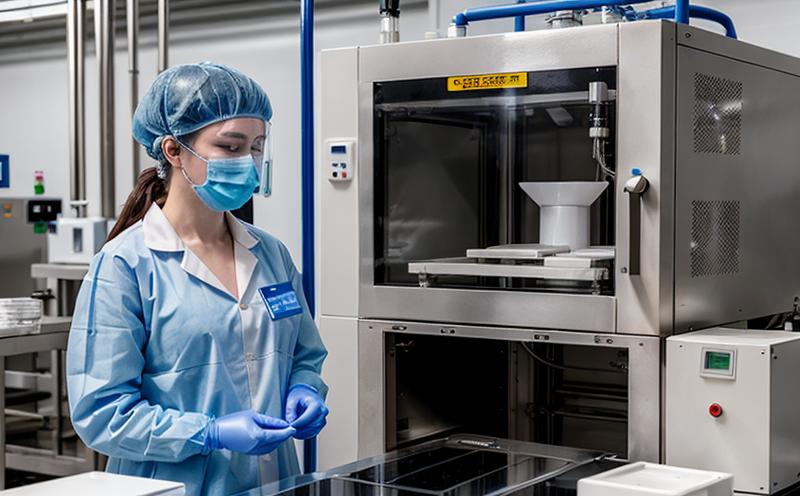GMP Bioburden Testing of Raw Materials
In the pharmaceutical industry, ensuring that raw materials meet Good Manufacturing Practice (GMP) standards is critical to maintaining product quality and safety. GMP bioburden testing specifically examines the microbial load present on raw material surfaces. This testing ensures that the materials are free from harmful microorganisms that could compromise final drug products or lead to contamination issues in manufacturing processes.
The importance of this test cannot be overstated, particularly given the high stakes involved with pharmaceutical production. Even a small amount of bioburden can have significant consequences, leading to product recalls and potential harm to consumers. GMP bioburden testing helps manufacturers adhere to regulatory requirements such as those outlined in ISO 11737 series standards.
The process involves collecting samples from raw materials and analyzing them using methods that quantify viable microbial cells. Common techniques include plate count agar, membrane filtration, or ATP bioluminescence. Once the sample is prepared, it undergoes incubation under controlled conditions to allow any present microorganisms to grow. The growth is then quantified either visually through colony counts or via more sensitive detection technologies.
The results of this testing are crucial for several reasons:
- To ensure compliance with regulatory requirements and industry standards,
- To protect the reputation of the manufacturer by preventing product recalls,
- To safeguard public health from potential contamination risks, and
- To maintain the integrity of manufacturing processes.
By investing in thorough GMP bioburden testing, pharmaceutical companies can reduce the risk of introducing contaminants into their supply chain and ultimately into the final drug products. This proactive approach not only enhances product safety but also strengthens brand trust with consumers.
Why It Matters
GMP bioburden testing is essential for maintaining high standards in pharmaceutical manufacturing due to its direct impact on patient safety and regulatory compliance. The presence of even low levels of microorganisms can lead to severe issues, including spoilage of raw materials or contamination during production.
- Product Contamination: Microbial contamination can result in the degradation of active ingredients, leading to ineffective medications.
- Regulatory Penalties: Non-compliance with GMP standards could lead to significant financial penalties and legal action from regulatory bodies.
- Consumer Trust: Ensuring safe products builds trust among consumers and enhances brand reputation.
The potential consequences of failing bioburden testing are substantial. Not only do they pose risks to patient health but also threaten the financial stability of pharmaceutical companies. Given these challenges, it is imperative for manufacturers to prioritize GMP bioburden testing as part of their quality assurance protocols.
Eurolab Advantages
At Eurolab, we offer comprehensive and reliable GMP bioburden testing services tailored specifically for the pharmaceutical sector. Our state-of-the-art facilities and experienced team ensure that every test meets the highest standards of accuracy and consistency.
- Accurate Results: Utilizing advanced technologies like flow cytometry, we provide precise quantification of microbial loads.
- Comprehensive Reports: Our reports are detailed and compliant with international standards, providing actionable insights for your quality management team.
- Custom Solutions: We tailor our testing protocols to meet the unique needs of each client, ensuring that all requirements are addressed effectively.
- Regulatory Compliance: All tests are conducted in strict adherence to relevant regulations and guidelines.
Our commitment to excellence is reflected not only in our methodologies but also in our dedication to continuous improvement. By partnering with Eurolab, you gain access to expert knowledge and resources that can significantly enhance your manufacturing processes.
Use Cases and Application Examples
| Use Case | Description |
|---|---|
| Raw Material Incoming Inspection | Ensuring that newly received raw materials are free from contamination before they enter the production line. |
| Potable Water Testing | Checking water supplies used in manufacturing processes for potential microbial growth. |
| In-process Monitoring | Continuous monitoring during production to detect any unexpected spikes in bioburden levels. |
- Pharmaceutical Excipients: Testing excipients like lactose, cornstarch, and magnesium stearate for microbial contamination.
- Vaccine Production: Ensuring that all components of vaccines are free from viable microorganisms to prevent spoilage.
These examples illustrate the versatility and importance of GMP bioburden testing in various stages of pharmaceutical production. By incorporating these tests into your quality assurance protocols, you can ensure consistent product quality and safety.





